Recent Fire Damage Posts
Staying Warm Without Starting House Fires | SERVPRO of Northeast Charlotte
1/16/2024 (Permalink)
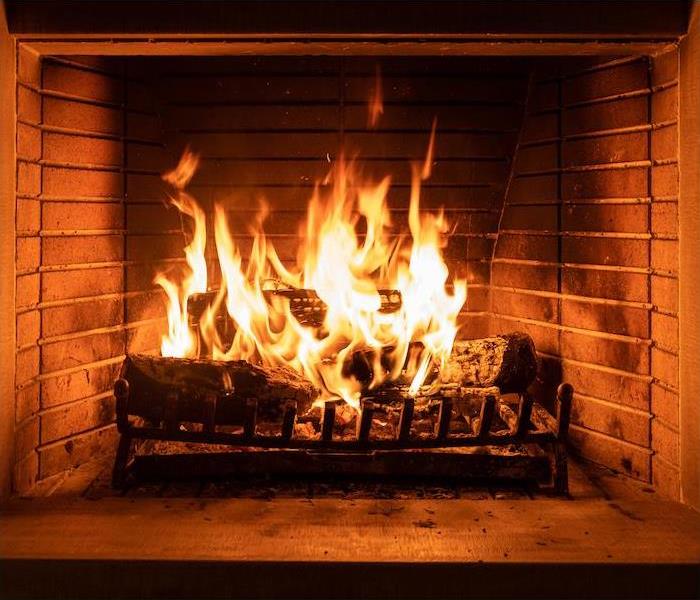 Fire safety is a top priority for us at SERVPRO of Northeast Charlotte this winter. Keep your home safe with these helpful tips!
Fire safety is a top priority for us at SERVPRO of Northeast Charlotte this winter. Keep your home safe with these helpful tips!
The temperatures have dropped, and we are all spending much more time indoors at this time of year. While we are grateful to not suffer through extreme winter weather, we do see our fair share of chilly days and snow is not out of the question on any given year.
While we hunker down for the season, many of us lean on our heat sources like fireplaces and space heaters for some extra warmth. Unfortunately, that’s also what causes a spike in house fires across our community. Our SERVPRO of Northeast Charlotte team explains more about how to stay warm without starting an out-of-control fire below.
Safeguarding Your FireplaceA softly crackling fire can be the perfect backdrop for the season, but only if your fireplace is properly prepared. Wood-burning fireplaces need to be cleaned regularly to remove ash buildup, and the chimney should be inspected and cleaned to remove creosote buildup.
Keep flammable materials and possessions far away from the fireplace as well as off the mantle, and make sure you are checking your smoke detectors regularly and replacing batteries as needed. If your fireplace is gas or electric, you should be inspecting it before turning it on to check for loose lines or leaks.
Space HeatersWe all love the portability and convenience that space heaters can offer, but they can be dangerous if they are misused. In fact, space heater mishaps are responsible for 1,700 house fires every year.
The best way to avoid space heater fires is to make sure the surface you set yours up on is able to withstand the heat. Choose a hard, nonflammable surface that is far away from things like curtains and couch cushions, and always check the cord for signs of fraying before turning it on.
Create a three-foot barrier around your heaters to keep your kids and pets away from it, and never leave it unattended in a room. In addition, you should always be turning off your space heater completely before going to bed.
Safety Features to Look ForNot all space heaters are good investments, so doing your research before buying anything is always recommended. Just because it’s cheaper doesn’t necessarily mean its a good (or safe) deal!
First, choose a reliable company that has passed all of their certifications for safety and check their reviews to make sure it has been a reliable purchase for other users. A helpful feature that you should consider is a safety shutoff switch. These switches are programmed to turn your heater off after a certain period of use, which can be really helpful for busy families or if you have trouble remembering to turn things off.
Finally, you need to inspect the cord that is attached to the heater. It should be well-made and not showing any signs of fraying or have any loose connections, and it should also be at least six feet long so you can easily set it up in a safe location.
Have a safe and warm winter season! If you do suffer from any sort of fire damage, call SERVPRO of Northeast Charlotte right away for a quick and reliable restoration.
A quick fire damage restoration is just a phone call away. Call SERVPRO® for immediate assistance.
Cook With Fire Safety In Mind This Holiday Season | SERVPRO of Northeast Charlotte
11/17/2023 (Permalink)
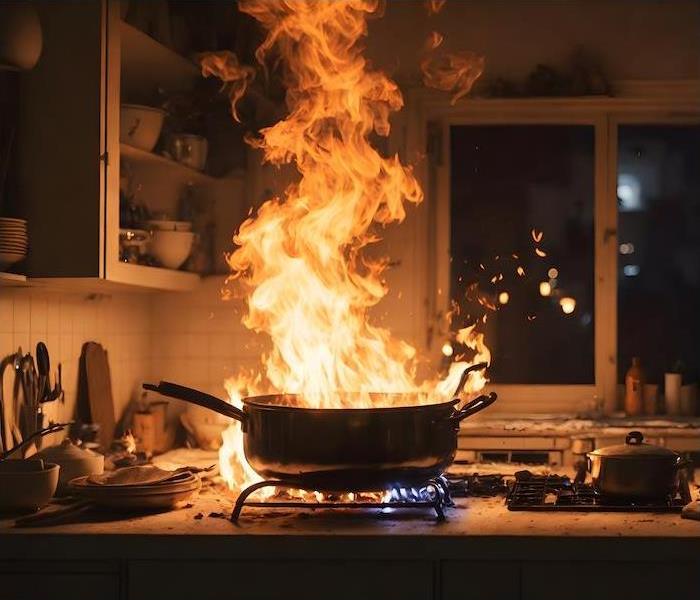 Fire damage in your home? Not for long with SERVPRO of Northeast Charlotte on the case!
Fire damage in your home? Not for long with SERVPRO of Northeast Charlotte on the case!
What is the one dish that every member of your family requests from you during the holiday season? Whether it is a famous cookie that you spent years perfecting or a turkey casserole that is always the first to run out during a family gathering, you are most definitely spending more time in the kitchen this season getting ready for your next holiday gathering.
Kitchen fires can happen at any time, but they are unfortunately more common during the fall and winter months. Taking preventive steps toward avoiding a kitchen fire while you are cooking this year can help you avoid costly and season-ruining damage.
Keeping Your Kitchen ClearThe first thing you should do is prepare your space for cooking. Make the kitchen a kid- and pet-free zone and clean up a little before you get started.
Remove clutter from the countertops and pick up anything left strewn about on the floor. You should also remove flammable materials from near your stove, so anything like pot holders, oven mitts, holiday decor and wooden utensils should be put away or moved far away from your burners.
You should also dress for success in the kitchen! Holiday accessories or seasonal aprons may be fun, but they can be dangerous if they get too close to a flame. Keep your sleeves rolled up, and be mindful about how you are dressing in the kitchen.
Stay Within Sight of Your KitchenFrying, baking, boiling and sauteing can all be dangerous in their own ways and can lead to serious fire situations in seconds. Leaving your kitchen even for a moment is enough time for a fire to catch and spread. Stay close by and monitor the food you are working so hard to make.
If you and your family partake in the tradition of deep-frying a turkey, be sure someone is remaining responsible and in control of the situation. Keep the fryer on a level and non-flammable surface and follow all of the rules and precautions while filling the fryer with oil.
Do your research and thaw your turkey completely in advance. Even a partially frozen section of your turkey can react with the oil and cause it to splatter and pop.
Check Your Smoke Alarms and ExtinguishersThese steps can go a long way toward helping you avoid fire in the kitchen, but we all know that fire is unpredictable and can get out of control at any time. Having smoke alarms in your kitchen is crucial for alerting you to a developing situation right away. Check the batteries monthly and replace as needed.
You should also invest in a fire extinguisher that stays in your kitchen. Having a reliable way to snuff out a few flames quickly can help you minimize a situation as it appears. You should also keep a pot or extra lid nearby while cooking so you can quickly cover and smother a grease fire.
We wish you and yours a safe and relaxing holiday season without the risk of fire! However, we are always here for you if an accident occurs and your kitchen is left damaged. We will work hard to restore your affected space as quickly as possible so you can get back to your festivities ahead.
House fires can happen in the blink of an eye. Contact us for a quick restoration day or night!
Responsible Summertime Grill Tips | SERVPRO of Northeast Charlotte
9/19/2023 (Permalink)
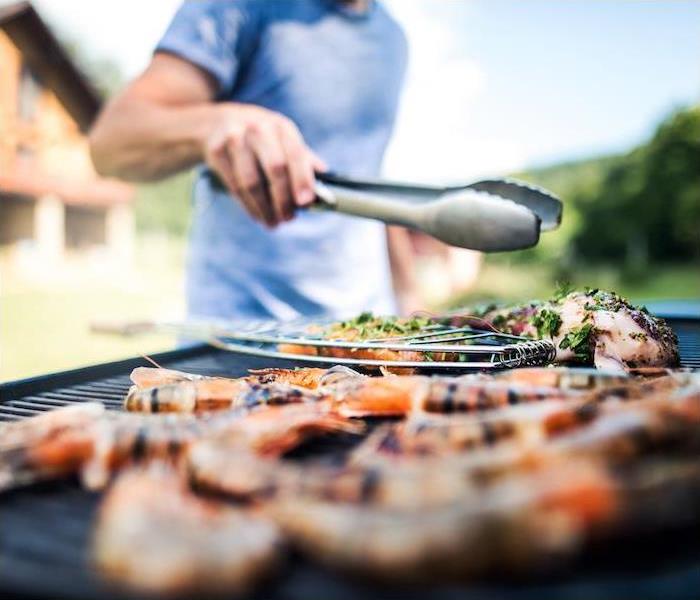 Have you had a barbeque gone wrong? Call SERVPRO of Northeast Charlotte to get your space back in shape.
Have you had a barbeque gone wrong? Call SERVPRO of Northeast Charlotte to get your space back in shape.
Summer is one of the best seasons in the Charlotte area in our humble opinion! We love to hang outside on a gorgeous sunny day and relax with our friends and family. Included in these picturesque days, of course, is a freshly grilled burger or hot dog and a cold beverage.
Grilling season is great for many reasons, but this time of year also means the peak of grill fires. Improper use of a grill can quickly turn into a dangerous situation and leave you with significant home and property damage. Our SERVPRO® of Northeast Charlotte team wants you to enjoy your backyard BBQs safely, so read on to learn some great grill safety tips.
Setting Up for SuccessPreparing your workspace is one of the most important places to start. Make sure your grill is fully outside. That includes setting it up far away from the garage and be sure it is not underneath any overhangs from your roof. It needs to vent properly as well as avoid starting anything on fire above the heat and flames.
The place you choose should be on level and sturdy ground that is at least 10 feet away from your siding or wooden deck railing. This barrier is also a great boundary for any kids or pets in attendance.
Now it’s time for your equipment inspection! Charcoal grills should be checked for dents or cracks along the drum, and your vent covers should easily be able to slide. Take the time to clear out any ash buildup as well. Propane grills should have their gas lines checked and inspect the tank itself for any dents or signs of a leak. A single gas leak can lead to a seriously dangerous situation for everyone in your party.
Manning the GrillOnce the grill is lit and your food is sizzling away, don’t go anywhere. A responsible grillmaster always stays nearby and has a water source ready to use just in case. Keep your hose at the ready and consider having a spray bottle on hand to help knock down any sparks or flare ups.
Once your food is done, hand off the plate to someone else to bring inside and get to work shutting everything down. Close vent covers and scatter coals, or shut off all burners and close your propane tank. Remove any ash once it has cooled and put it in a metal can close by. After your party is over, check on your grill one more time to make sure everything is cool to the touch before going to bed.
We hope you enjoy the rest of the summer season in the Charlotte area, but remember that SERVPRO of Northeast Charlotte is here for you if an accident occurs and you are left with fire damage to your home or property.
Don’t let fire damage linger in your home. Call us at SERVPRO of Northeast Charlotte for a fast restoration.
Our Tips for Responsible Fall Bonfire Safety | SERVPRO of Northeast Charlotte
9/19/2023 (Permalink)
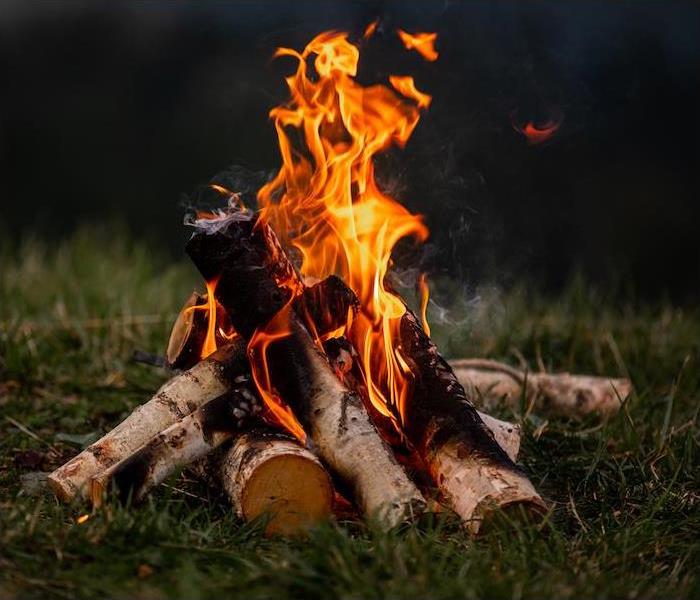 Bonfire season is upon us! SERVPRO of Northeast Charlotte has your back with these helpful fire safety tips.
Bonfire season is upon us! SERVPRO of Northeast Charlotte has your back with these helpful fire safety tips.
The fall season is almost here, and while the current temperatures may not reflect it, we are certainly glad to see the seasons changing. All of the fall decorations, pumpkin spice and increased time spent outdoors in the less harsh heat and humidity can get you in the mood for the fun holidays ahead.
One way that many people enjoy the fall season is by sitting around a bonfire. While this can certainly be a fun way to enjoy this time of year, that doesn’t mean the risk of starting a wildfire isn’t there.
Our SERVPRO® of Northeast Charlotte team offers up some helpful fire safety tips below so you can start and maintain your bonfires with safety in mind.
Starting the Fire SafelyDo pick a safe spot for your fire pit. You may not be able to move your permanent fire pit, but you can make sure brush or log piles are a safe distance away and that the trees are trimmed above the pit.
Do keep water close by. Have a hose unraveled and ready to use or a bucket filled with water that you can quickly dump over any unwanted flames. If you don’t have easy access to water, a shovel and some dirt can also quickly snuff out any wandering flames.
Do watch the forecast and keep an eye on any weather conditions. Really windy days or dry conditions can make it really easy for a fire to catch and spread, so always check on our local burn bans before lighting anything.
Tips After the Fire Is GoingDon’t use any gas or lighter fluid to boost your fire. While these substances are highly flammable, they are also highly unpredictable and can make your fire too large too fast.
Don’t let any kids or pets play too close to the flames. Accidents happen and kids can get seriously hurt in seconds, or a curious child can quickly spread the fire beyond the pit without much warning.
Don’t let your flames get out of control. Keep your bonfires small and manageable. The higher and larger the fire, the harder it is to control in emergency situations.
Don’t go to bed until you are sure the fire is completely out. Pour water over the flames or hose them down until everything is cold to the touch.
Additional Fire SafetyWildfires can start in any manner of ways, but most wildfires are actually started by humans. Stay close to your fire, keep it small, and have a way to extinguish any flames quickly.
If your property or home is ever damaged by a fire that has gotten out of control, contact us right away for a full restoration.
Fire can cause a lot of damage in a short amount of time. Contact us day or night for immediate assistance.
Training Your Employees for a Fire Emergency | SERVPRO® of Northeast Charlotte
3/30/2023 (Permalink)
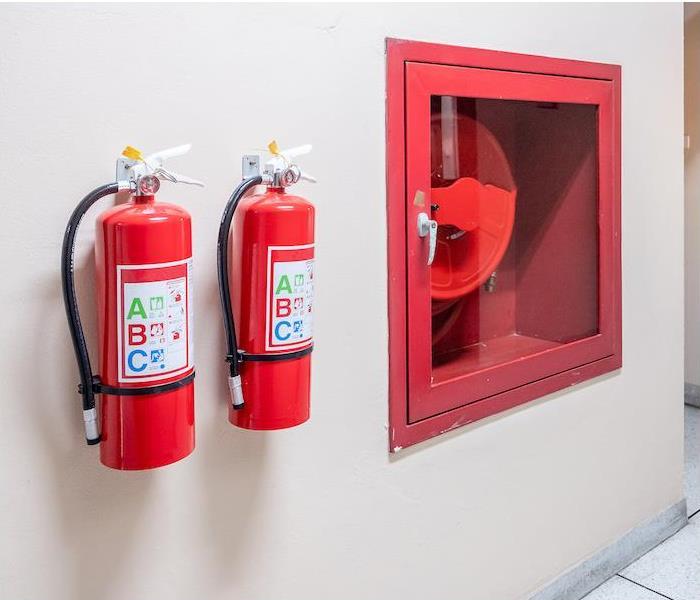 Dealing with the aftermath of a commercial fire? SERVPRO of Northeast Charlotte is your local restoration expert.
Dealing with the aftermath of a commercial fire? SERVPRO of Northeast Charlotte is your local restoration expert.
Dealing with emergencies at work is part of owning or operating a commercial business. Small situations can often be handled by yourself or your maintenance crew, but larger problems can impact your entire staff.
Whenever fire is concerned, it is crucial that your team understands how to react to help minimize the situation.
Fires can create chaotic situations, so having a plan that your employees can follow can help keep everyone focused and safe. Teaching your staff fire safety basics and how to use a fire extinguisher can go a long way in an emergency!
Using a Fire ExtinguisherHaving a fire extinguisher on your property is one of the foundational parts of fire safety. If you have one, OSHA requires that you give your employees the training they need in order to operate one. This includes how to work the fire extinguisher(s) on your property and what situations require one.
Don’t be afraid to get hands-on with your training and let your employees handle your fire extinguisher. Get it out of the case or storage area and let them practice aiming it and pulling the pin. It’s even better if you can have them practice putting out an imaginary fire by sweeping across the flames and standing back at a safe distance of six to eight feet.
Having an easy way to remember how to use a fire extinguisher can increase your employees’ chances of using it correctly when it is really needed. Teach them the acronym PASS!
The fundamentals of fire extinguishers and fire safety cannot be overlooked, and should be taught at least once a year to your staff.
Also, don’t forget to assign certain roles to a few trusted or veteran staff members. If you have someone on your team who is confident and focused in stressful situations, have him or her be the point person for fighting the fire. Others can also help by calling 911 and getting the rest of your team to safety.
Prioritize Your TeamFire reacts differently in different situations. Small fires in restaurants are much different than if a fire breaks out in one of the local business district buildings, like off of Hendry Road. If the situation escalates, it can become dangerous really quickly for your team.
Safety should always be your main focus during your training, so ensure that your staff understand that their safety is your top priority in any situation. If at any point any of your employees feel unsafe or uncomfortable staying to fight the fire, teach them that it is OK for them to seek a safe way out of the building.
Building a fire safety plan with your team can help make your staff’s response to an emergency much more seamless. Using these tips can build your employees’ confidence in any fire situation in the future.
Dealing with the aftermath of a commercial fire? Our SERVPRO specialists can restore your losses and return your workplace to its pre-fire condition.
Your Home’s Risk of Lightning Fires | SERVPRO® of Northeast Charlotte
9/28/2022 (Permalink)
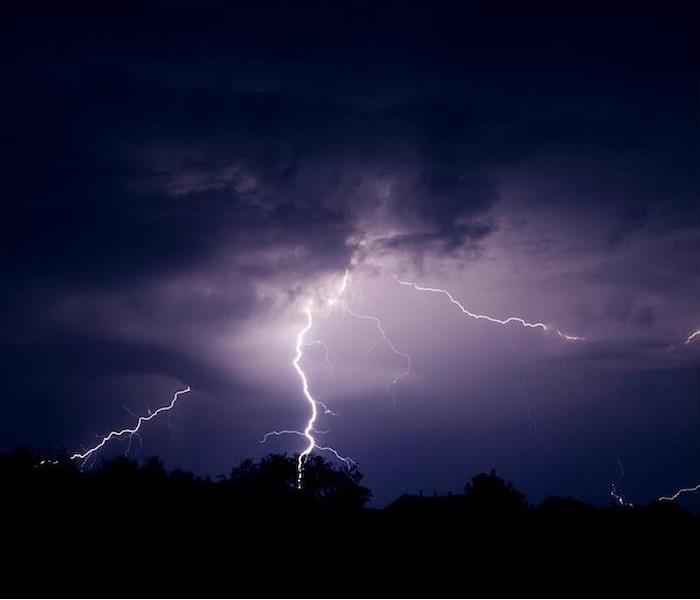 If you are dealing with smoke or fire damage from a recent fire, call SERVPRO of Northeast Charlotte to learn about a restoration solution for your is
If you are dealing with smoke or fire damage from a recent fire, call SERVPRO of Northeast Charlotte to learn about a restoration solution for your is
Whenever fire affects your home, it can be dangerous and cause extensive damage. Thankfully, many internal home fires can be prevented by staying attentive to any cooking or being responsible for flames you light. However, when the fire risk originates naturally, it can be much harder to prevent.
Thankfully, being personally struck by lightning is still a rare occurrence, but lightning strikes on houses are actually relatively common. Approximately 70,000 damage claims were reported due to lightning in 2020. If your home is struck by lightning, take the following precautions to help reduce your risk of damage or injury.
Lightning Formation
Lightning begins as a giant spark that travels from the clouds to the ground (or your roof). Normally, lightning is associated with severe weather, but it can also happen during forest fires, heavy snowstorms and even dry conditions.
Lightning and Your Home
If lightning does strike your home, it can be immediately a dangerous situation and will often start a fire due to the intense heat and transfer of electrical current. If a fire does break out, you might not notice it right away if it starts in your attic or in one of your walls.
Even if you don’t see the fire, you will probably immediately know what happened because lightning strikes are immensely loud and can produce a burning smell as they burn whatever they touch on the way down.
Installing a lightning rod can help reduce the impact of damages to your home. A lightning rod is designed to help deflect and absorb the impact of a lightning strike so your home doesn’t have to take the full force of its energy.
It might also be a good idea to buy a surge protector for your electrical panel to avoid a major problem if the strike hits your electrical box.
Lightning in the Area
If your home avoids a direct lightning hit during a storm, that doesn’t necessarily mean you are out of the woods! If a strike hits a neighboring house, it can also start an out-of-control fire if the flames aren’t controlled quickly. An average of 9,000 wildfires are caused by lightning strikes every year.
Reduce the risk of your property catching fire by cleaning up brush or dead leaves, and check your smoke detectors every month to ensure they are ready to alert you of any danger.
If you do encounter a fire, call 911 immediately and exit your home as soon as you can. When the fire is out and it is safe to re-enter your home, call us at SERVPRO of Northeast Charlotte.
Fire damage can be extensive and tricky to restore, but we are highly trained and passionate about the restoration process. We will get you back into your fully restored home right away!
Have you experienced smoke or fire damage in your home? Call us today to get the restoration finished fast.
The 4 Components for Starting and Ending a Fire | SERVPRO® of Northeast Charlotte
1/31/2022 (Permalink)
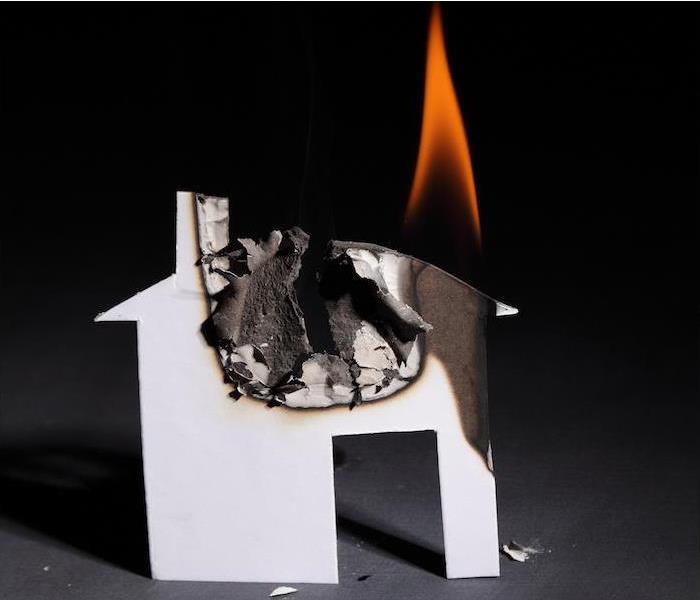 If your home or business has any damage, SERVPRO of Northeast Charlotte is ready around the clock to help you recover.
If your home or business has any damage, SERVPRO of Northeast Charlotte is ready around the clock to help you recover.
Have you heard of a tetrahedron? Don’t worry, we will share our answer with you! It’s a three-dimensional, triangular shape with four equal sides.
This discussion about the tetrahedron relates to fire safety, believe it or not. In fact, there is something called a fire tetrahedron, which relates to the four major components a fire needs in order to survive! Read on to learn more.
<h34-things-a-fire-needs-to-live">The 4 Things a Fire Needs to Live
Fuel. Fuel is clearly what will make something go, and fires need this in order to keep roaring! Things that can easily be burned, like wood, plastic or organic materials, will continually feed a fire with the fuel it needs.
Heat. A fire require heat in order to get it going and keep going. Once something has been exposed to heat, it will eventually ignite or melt, producing more fuel for a fire.
Oxygen. Oxygen is needed by every living thing, and a fire is no exception to the rule. Oxygen provokes an expanding series of chemical reactions, which can generate products of combustion in the process.
Chemical Chain Reaction. A chain reaction resulting from the three items mentioned above is what will continue to feed a fire. So long as the chain reaction isn’t disturbed, a fire will continue to burn.
<h34-ways-to-stop-a-fire">The 4 Ways to Stop a Fire
Cool it. The most common way to stop a fire is to cool it, or exhaust the heat! This is usually accomplished by dousing the fire in water. But remember that because of the heat, the water is likely to evaporate or even boil, so it will take a lot of water to put a fire out.
Smother it. Sometimes a fire can’t be put out with water alone; it will need to be smothered! Removing all oxygen will eventually put the fire out, because you are starving it from the oxygen it needs. This is the mechanism behind the popular “stop, drop and roll” mantra we’re taught as kids.
Starve it. Something has to keep feeding a fire, so therefore logically speaking, the best thing you can do is starve a fire. Remove any fueling agents like wood and grass in order to help the fire come to a natural end.
Interrupt the chain reaction. Another guaranteed success is to interrupt the chain reaction, and you can do this by using chemical agents like halon. While these agents are effective, halon also has an elevated potential for ozone depletion, meaning it is an environmental threat and has been banned.
If the fire tetrahedron makes a wreck of your home or business, we’re ready around the clock to help you recover. Contact SERVPRO anytime for fast, thorough cleanup and recovery after a fire.
The Leading Causes of House Fires | SERVPRO® of North Central Mecklenburg County
1/28/2022 (Permalink)
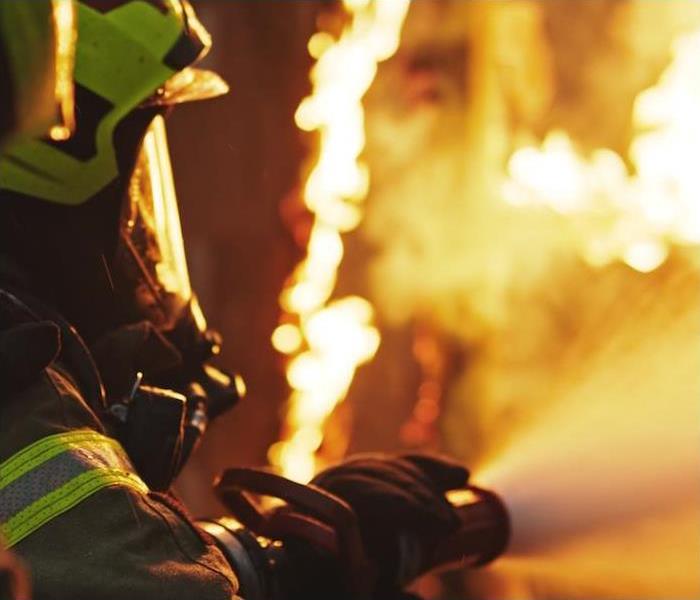 Regardless of the cause, SERVPRO of North Central Mecklenburg County is here for you if your home is affected by fire.
Regardless of the cause, SERVPRO of North Central Mecklenburg County is here for you if your home is affected by fire.
Any fire is dangerous, but a fire in your home is a menacing thought. Your family lives there, and fires are unpredictable. Fires spread quickly and cause a lot of devastation and disruption.
Obviously, we go to great lengths to avoid fires, and we have made some headway. Home fires have been reduced by 55% over the last 40 years.
However, despite this decrease, there are still too many fires happening in homes. Unfortunately, even with all of the ad campaigns to raise awareness, more than 25% of all reported fires still occur in homes.
Let’s take a look at the top causes of house fires, and see if we can get that number down by learning how we can prevent them:
Cooking. This is the No. 1 cause of home fires and injuries. Almost half of all home fires are initiated from unattended cooking! The one thing you can do to avoid a fire at home is to never leave your cooking unattended. Stay with the grill, stove and oven, or turn them off if you leave the room.
Heating equipment. These fires account for 14% of the total number of house fires, and they are caused by improper use, equipment malfunction or flammable materials being placed too close to space heaters.
Electrical fires. Overloading of circuits, faulty wiring and the generally higher usage of electricity in older homes are all components that contribute to electrical fires in homes. And still yet another top cause is the use of frayed or faulty outlets, appliance cords or extensions.
Intentional fires. It’s hard to fathom that 28,000 intentional home fires are started every year. When we say intentional, we mean arson! These are fires that are solely caused by someone setting them to destroy, not fires set for other purposes that get out of control.
Smoking materials. Even though smoking materials are only responsible for 5% of home fire occurrences, they are the leading cause of civilian fire deaths. Often, as cigarettes are left burning, people fall asleep, which makes the victims more susceptible.
Regardless of the cause, SERVPRO is here for you if your home is affected by fire. Contact your local team today to see how we can help.
Keep Fires at Bay in the Warmer Months | SERVPRO® of North East Charlotte County
1/28/2022 (Permalink)
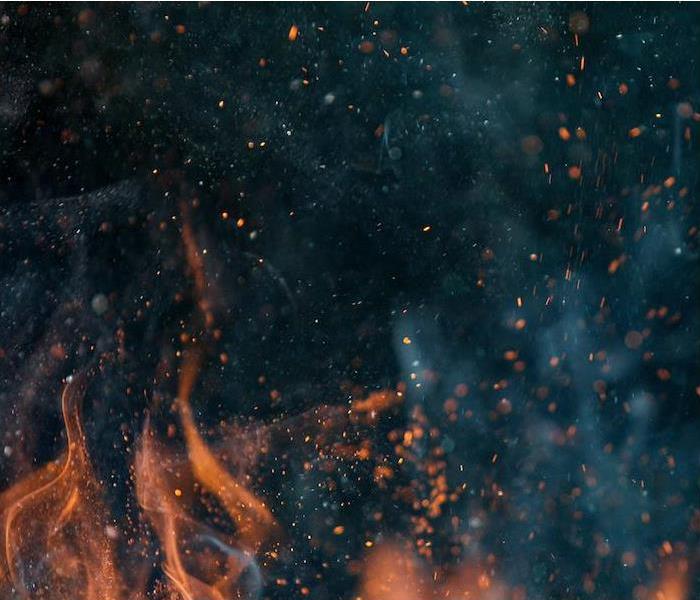 Restoring fire and smoke damage is one of our specialties.
Restoring fire and smoke damage is one of our specialties.
Looking forward to summertime is welcome event after the long cold months of winter. Spring is in full bloom, and summer is right around the corner.
It’s a time of renewal and getting outdoors. There are plenty of activities to do outdoors such as hiking, going to the lake, grilling and barbecuing with friends and family, just to name a few.
With the warmer weather families will begin to gather for reunions, graduations and the seasonal cookouts that everyone loves. That also brings with it the risk of increased fires.
Unfortunately, spring sees more daily fires on average than any other time of year. But by being cautious, you can minimize fires at home this season.
Here are some great places to start:
The grill. By and large, the grill is one of the biggest culprits of spring fires. It presents a substantial risk due to the combination of flame, grease, heat and gas. But just taking a few precautions can greatly reduce the risk of a fire on the barbecue grill! Make sure the grill is cleaned prior to every use and that all parts are in proper working order. Replace any worn or damaged components before grilling and keep the grill at least six feet away from any flammable objects, especially the house! Lack of proper cleaning is responsible for almost 20% of grill fires!
The fire pit. While the grill get its share of blame for accidental fires, the fire pit can be dangerous as well. Gathering on a cool spring or summer evening around a fire pit can provide some of the best rest and relaxation after a long day or week. Keep these safety tips in mind: Kids should never be left alone around a fire pit. Keep a bucket of water close by. Don’t add pine needles or leaves to a fire pit as this can cause “flare-ups” and embers can be carried away by the wind. If you are cooking hot dogs or roasting marshmallows do it over the embers and not the open flame, which will help avoid the flame damage and help you get that elusive perfect roasted finish that you’re looking for.
Chimneys and dryer vents. Chimneys should be inspected and cleaned by a professional at least once every season. Ash, soot and creosote buildup is a major cause of fires, and with proper maintenance, this risk can be reduced. The failure to clean dryer vents is a leading cause of fires that emanate from the dryer.
Our technicians are on hand 24⁄7 for emergencies. If you encounter fire damage at your home or business, no matter the cause, we will be there faster and have it cleaned up sooner. Call or click today and experience the SERVPRO difference.
Keep Fires at Bay in the Warmer Months | SERVPRO® of North Central Mecklenburg County
6/3/2021 (Permalink)
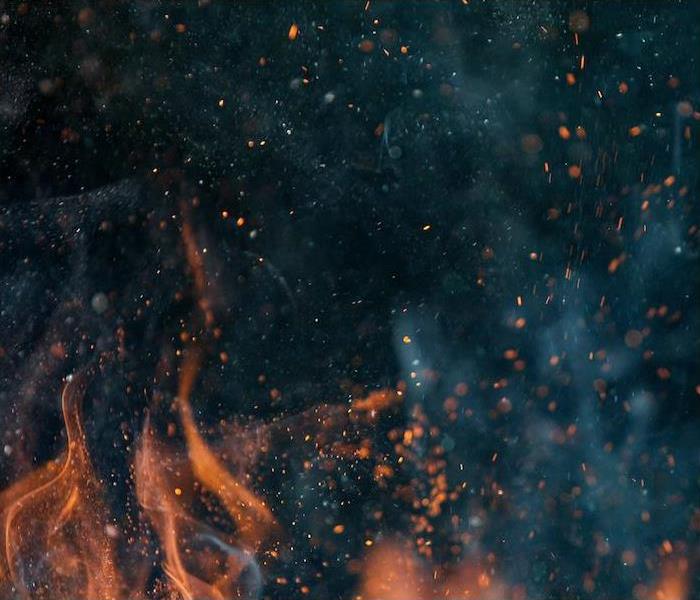 Summer Home Fires
Summer Home Fires
Looking forward to summertime is welcome event after the long cold months of winter. Spring is in full bloom, and summer is right around the corner.
It’s a time of renewal and getting outdoors. There are plenty of activities to do outdoors such as hiking, going to the lake, grilling and barbecuing with friends and family, just to name a few.
With the warmer weather families will begin to gather for reunions, graduations and the seasonal cookouts that everyone loves. That also brings with it the risk of increased fires.
Unfortunately, spring sees more daily fires on average than any other time of year. But by being cautious, you can minimize fires at home this season.
Here are some great places to start:
The grill. By and large, the grill is one of the biggest culprits of spring fires. It presents a substantial risk due to the combination of flame, grease, heat and gas. But just taking a few precautions can greatly reduce the risk of a fire on the barbecue grill! Make sure the grill is cleaned prior to every use and that all parts are in proper working order. Replace any worn or damaged components before grilling and keep the grill at least six feet away from any flammable objects, especially the house! Lack of proper cleaning is responsible for almost 20% of grill fires!
The fire pit. While the grill get its share of blame for accidental fires, the fire pit can be dangerous as well. Gathering on a cool spring or summer evening around a fire pit can provide some of the best rest and relaxation after a long day or week. Keep these safety tips in mind: Kids should never be left alone around a fire pit. Keep a bucket of water close by. Don’t add pine needles or leaves to a fire pit as this can cause “flare-ups” and embers can be carried away by the wind. If you are cooking hot dogs or roasting marshmallows do it over the embers and not the open flame, which will help avoid the flame damage and help you get that elusive perfect roasted finish that you’re looking for.
Chimneys and dryer vents. Chimneys should be inspected and cleaned by a professional at least once every season. Ash, soot and creosote buildup is a major cause of fires, and with proper maintenance, this risk can be reduced. The failure to clean dryer vents is a leading cause of fires that emanate from the dryer.
Our technicians are on hand 24⁄7 for emergencies. If you encounter fire damage at your home or business, no matter the cause, we will be there faster and have it cleaned up sooner. Call or click today and experience the SERVPRO difference.
Living Room Fire Damage Cleanup in Charlotte
3/23/2020 (Permalink)
 Contact SERVPRO for fire damage mitigation. We are always available to help you.
Contact SERVPRO for fire damage mitigation. We are always available to help you.
Our Experiences Technicians at SERVPRO Know Exactly What to do After a Fire
Fire damage of any size should have professional mitigation. The main reason is even small amounts of soot can spread. Not only is it unhealthy to breathe and a potential skin irritant, but the particulate can also result in pungent odors throughout the home.
When SERVPRO handles fire damage in Charlotte homes, special care goes into saving homeowners the cost of replacing items. In many cases, contents without charring but smoke damage have restoration potential.
Before the technicians arrive on-site, there are numerous actions that homeowners can take to assist in limiting the loss to their structure and contents.
- Talk to the fire department and ascertain if it is safe to remain in the home.
- Avoid the fire loss area and limit movement within the home; if you choose to remain in the house, this helps avoid driving soot particles into upholstery and carpet.
- Do not attempt to clean any of the smoke damage, using improper solutions and methods can drive soot deeper into surfaces and cause permanent damage.
- Use clean towels or linens on rugs, carpet traffic areas, and upholstered furnishings.
- If the electricity is nonfunctional, and fire loss affected the kitchen, empty the refrigerator and prop the doors open as it will require cleaning.
- Chrome handles and knobs get protected from the caustic soot through an application of petroleum jelly or oil.
- Remove houseplants outdoors and wash both sides of the leaves.
- Ensure the HVAC is off.
Fire Loss Cleanup
When the techs work on fire loss, they take an organized approach to cleaning. After removing furnishing out of the living room, SERVPRO technicians use deep steam cleaning to pull the particulate out of the fibers and eliminate smoke odors. This method of carpet shampooing leaves behind no residues resulting in truly clean fibers and backing. Walls get attention to remove smoke damage, and when residual odors remain, the techs apply a sealant to lock in deeply embedded soot particles and leave a clean surface ready for painting.
SERVPRO of North Central Mecklenburg County at (704) 596-9700 stands ready to assist local property owners with any size or type of fire damage and make the loss to their homes, "Like it never even happened."
See more about Charlotte.
Fire Damage In Your Charlotte Home
2/18/2020 (Permalink)
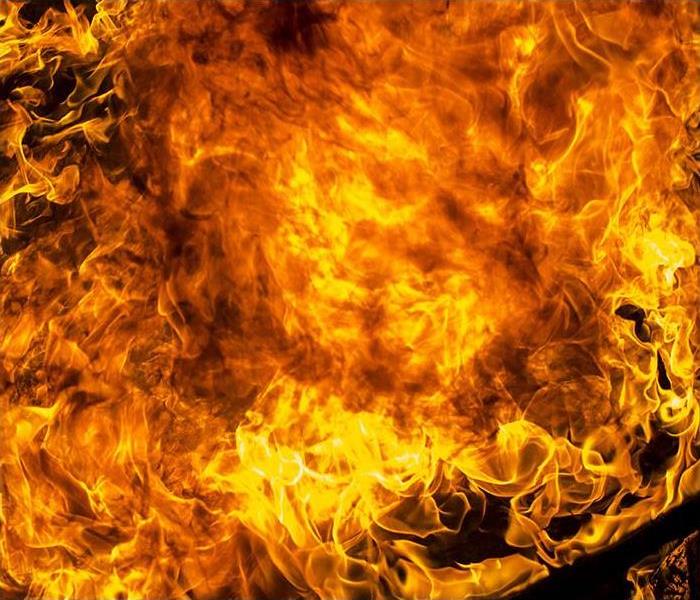 We’re Faster to Any Size Disaster.
We’re Faster to Any Size Disaster.
Restoring Porch and Attic Fire Damage in a Charlotte Home
A fire that started on the porch of a house in Charlotte spread to the attic before the fire department controlled it. The homeowner was glad that the fire did not consume the entire property, but there was still the issue of damages to address. The arrival of SERVPRO green trucks was the first sign of reassurance.
The fire damage in the Charlotte home affected some of the exterior and interior areas since it started on the porch before spreading through the wall materials to interior areas. Various challenges were apparent immediately we arrived at the site. For example, although many of the affected building materials could be salvaged, processes such as cleaning would be challenging because of the unfinished nature of their surfaces. It is harder to remove residues from rough surfaces, and the open pores allow deeper penetration of residues, complicating deodorization. Our SERVPRO crew brought a soda blaster to the loss site to help clean such materials.
Away from the building materials, the contents affected by the flames also posed a different kind of challenge because we had to sort them out to determine what was damaged completely, and what could be salvaged. With everything either charred or covered in soot, making the necessary distinctions was not that easy. Our SERVPRO team started the process by doing thorough sorting to establish salvageable, unsalvageable, and questionable items. We also liaised with the homeowner to establish items of value.
Away from the main sections damaged by the flames, other areas in the house required a general cleaning to remove smoke residues and bad odor. We expedited the process by using procedures such as cleaning with chemical sponges, which remove residues from surfaces without leaving smudges. We also mixed water-based deodorizers with the cleaning solutions to take care of deodorization during the cleaning process.
Trashcan fires and other ignitions outside the house can cause severe fire damage. Call SERVPRO of North Central Mecklenburg County at (704) 596-9700 to help you deal with such damage. We’re Faster to Any Size Disaster.
For more about Charlotte click here.
Mecklenburg County Fire and Soot Mess? What To Do? Call SERVPRO!
1/13/2020 (Permalink)
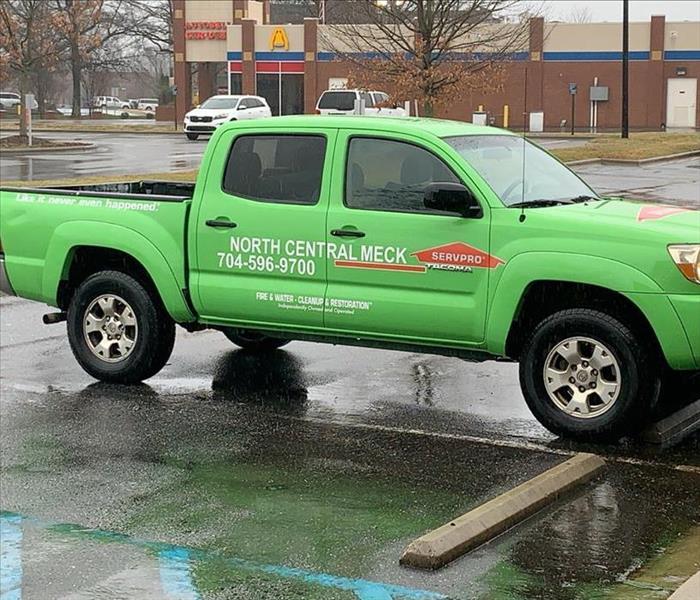 When this SERVPRO Service Vehicle Is Parked on Your Mecklenburg County Property--You Know Help for Fire and Smoke Damage Has Arrived!
When this SERVPRO Service Vehicle Is Parked on Your Mecklenburg County Property--You Know Help for Fire and Smoke Damage Has Arrived!
Approaches for Cleaning Smoke Residues in Mecklenburg County
Beginning with the point of ignition, the effects of a fire loss incident lessen the farther away from this point that you get in a Mecklenburg County home. While concentrations of ash and soot might be the strongest at the origin of the blaze, adjacent rooms and areas to this damaged region can experience a lower buildup of soot and smoke residues. Effective cleaning of these areas begins with the right process to loosen the buildup with mechanical actions.
Because not all fire damage in Mecklenburg County homes is the same or the same level of severity, the process to clean and restore these areas varies multiple times in the same residence. Building an understanding of the best agitative cleaning practices to reduce the severity of buildup on surfaces and contents can maximize the efficiency of our SERVPRO professionals working in the house.
Each level of debris buildup (mild, medium, and heavy) has different techniques, tools, and processes. Mild agitation is ideal for when soiling is not thick and overwhelming. This level of damage would often be in nearby rooms to the origin point of the fire. Breaking up the sediment and residues can make later cleaning practices with foam, wiping, or media blasting methods more effective.
• Feather Dusting – Hard surfaces can sometimes benefit from feather dusting to loosen or even remove excess residues.
• Vacuuming – Smoke particles and soot can get vacuumed from surfaces with a HEPA filtered machine. The attachment brush can also help to break up surface residues.
• Brushes - Paintbrushes can do a lot for a softer removal of set in residues without damaging the underlying material.
• Compressed Air – Using pressurized air can have a direct effect on the buildup of wastes. This practice is not always the best for our SERVPRO team; however, as it can move loose particles into crevices and areas that are more challenging to reach.
As challenging as fire loss incidents can become, the right cleaning approach can help to protect many of the exposed surfaces. Our SERVPRO of North Central Mecklenburg County team has the equipment and personnel to make fire losses, “Like it never even happened.” Give us a call today at (704) 596-9700.
SERVPRO Knows Charlotte Property Owners Rely on Our Fire Damage Restoration Services for Great Results
12/15/2019 (Permalink)
 Charlotte Homeowners Expect SERVPRO to "Walk the Line" and Mitigate Fire Damage
Charlotte Homeowners Expect SERVPRO to "Walk the Line" and Mitigate Fire Damage
Overview of Professional Fire Damage Response in Charlotte
When your Charlotte home experiences a fire loss, it is understandable that you want recovery activity to proceed immediately. Understanding the steps professionals must take to prepare correctly for safe, efficient, and effective restoration helps our customers partner with our crews. Collaboration ensures that the ultimate result of our joint efforts is a secure, clean, dry, disinfected, and deodorized home for you and your family--“Like it never even happened.”
First We Inspect
Although our team is very familiar and skilled with fire damage restoration in Charlotte, every job we take on is unique. An in-depth inspection of the damaged area is essential before we can create the appropriate fire damage mitigation and remediation plan for your home. We trace the migration of smoke and soot residues throughout your property as damage can manifest far from the ignition site. Every moment taken to gather data increases the likelihood of superior results from our remedial actions.
Second We Evaluate
The SERVPRO team is highly qualified in the fire damage restoration industry’s best practices, including the theories of smoke, soot, and odor damage as well as applied strategies to mitigate and remediate the maladaptive results of a household blaze. We evaluate the characteristics and qualities of residues, the intensity of charring, and the presence of complications such as water damage and odors as we begin to prioritize and plan. Harm to structural components and contents are all part of the equation as we match products and protocols to the damage observed.
Third We Provide Emergency and Safety Services
Safety for you and your family and our crews are paramount considerations. SERVPRO completes emergency measures as needed to secure your property, including board up and tarping and water extraction. We can generate power for needed interventions if utilities are temporarily unavailable. We set up containment perimeters and operate air scrubbers to ensure the welfare of occupants and our workers.
Fourth We Complete a Detailed Remedial Agenda
Once safety and emergency protections are in place, SERVPRO’s crews work through a comprehensive clean up plan designed for your circumstances. Deep cleaning of surfaces and contents completes using precisely matched products and methodologies. We help arrange for rebuilding and repairs as needed. Structural drying, disinfection, and deodorization are critical tasks that, when taken together with our other efforts, return you fire-damaged home to preloss condition.
The talented and trained team at SERVPRO of North Central Mecklenburg County is ready to tackle your fire damage needs. Call (704) 596-9700 day or night, 365 days a year, to set up an assessment as the first step back to a secure and comfortable dwelling.
How well are you prepared for the damage from an unexpected fire?
10/18/2019 (Permalink)
 Each fire job requires a unique solution, we have your answers to restoring at SERVPRO!
Each fire job requires a unique solution, we have your answers to restoring at SERVPRO!
Smoke and soot is very invasive and can penetrate various cavities within your home, causing hidden damage and odor. Our smoke damage expertise and experience allows us to inspect and accurately assess the extent of the damage to develop a comprehensive plan of action.
Smoke and Soot facts:
- Hot smoke migrates to cooler areas and upper levels of a structure.
- Smoke flows around plumbing systems, seeping through the holes used by pipes to go from floor to floor.
- The type of smoke may greatly affect the restoration process.
Different Types of Smoke:
There are two different types of smoke- wet and dry. As a result, there are different types of soot residue after a fire. Before restoration begins, SERVPRO of North Central Mecklenberg County will test the soot to determine which type of smoke damage occurred. The cleaning procedures will then be based on the information identified during pretesting.
Have questions about Fire, Smoke, or Soot Damage? Call us Today- 704-596-9700
Dont forget about your fire alarms!
9/18/2019 (Permalink)
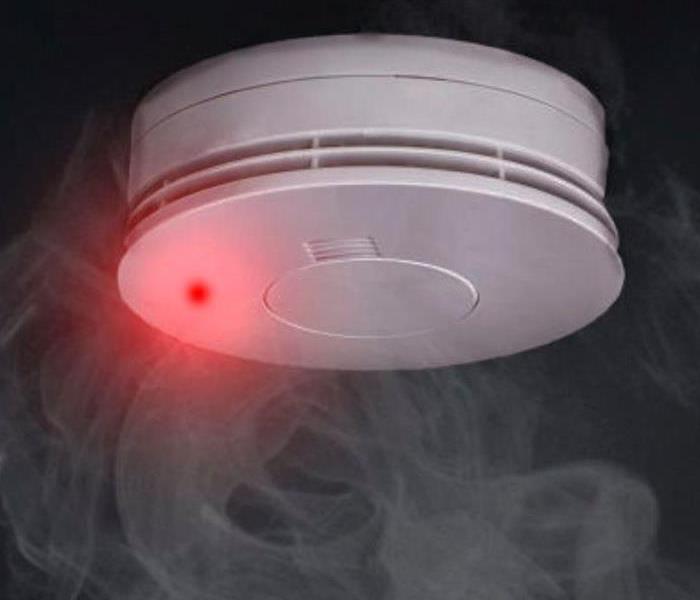 Fire alarm going off due to smoke
Fire alarm going off due to smoke
The number one reason to install a fire alarm is to make the building safe for your employees, customers, and tenants. A combination of smoke and heat detectors, sirens and bells, and strobe lights detect and alert building occupants of a fire, giving them ample time to evacuate in an orderly fashion. A few examples on why its important to test your alarms are as followed but not limited to:
- Fire alarms save lives
- Fire alarms reduce property loss
- Fire alarms shorten your recovery time
- Fire alarms may qualify you for insurance discounts
- Fire alarms keep you code compliant
The National Fire Alarm Code requires weekly and quarterly visual checks, more thorough semi- annual tests, and professional yearly inspections. Cleaning up after a fire and restoring a home or business to its original condition is a job that requires professionals. That's where SERVPRO of North Central Mecklenberg County comes in! Give us a call at 704-596-7900 todayin case a fire occurs & restoration is needed.
Grease Fires and How To Prevent Them
2/4/2019 (Permalink)
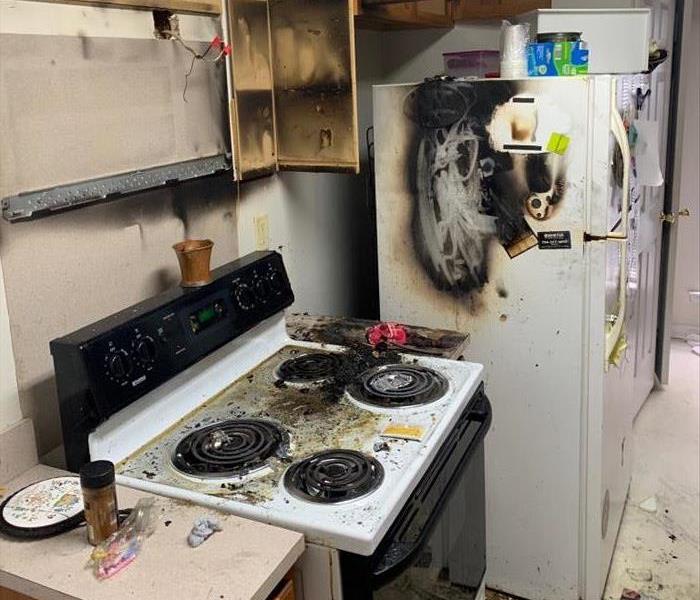 This kitchen suffered fire damage from a grease fire in the local Charlotte area.
This kitchen suffered fire damage from a grease fire in the local Charlotte area.
Grease fires are one of the number one causes of home fires and home injuries. A grease fire can potentially cause you to lose your kitchen, our even your home if they are not dealt with properly. Here are proper ways to deal with a grease fire and ways you can prevent a grease fire.
First off, how does a grease fire start?
- A grease fire can occur when cooking oil becomes too hot and begins to ignite itself. Vegetable oils commonly have a smoking point of 450 degrees Fahrenheit.
I've created a grease fire, what do I do?
- DO NOT PUT WATER ON A GREASE FIRE. Some may think the number one way to put out a fire is with water. As that may be correct in some situations, within this situation it is not. The water instead will cause the burning oil to splash which will cause the fire to spread instantly.
- Instead of using water, you want to starve the fire of oxygen so grab a metal lid or baking sheet and cover the fire.
- Turn off the heat source
- If the fire itself is small ,you can pour baking soda or salt to put it out. If you don't have those, you can use a Class B dry chemical fire extinguisher to extinguish the fire.
IF YOU CANNOT EXTINGUISH THE FIRE, EVACUATE IMMEDIATELY AND CALL 911
How do I prevent a grease fire?
- If you are ever cooking, frying, boiling, or any type of cooking, it is best to stay in the kitchen at all times to keep an eye on everything
- Keep anything flammable away from your stovetop
- If you exceed recommended grease temperatures and notice it begin to smoke, turn off the burner and let it cool.
- Keep a lid near the pan you are cooking in
Remember anytime you are cooking with heat, be smart and be prepared!
Ways to Prevent Kitchen Fires
12/28/2018 (Permalink)
 Kitchen Fire Spreading Quickly
Kitchen Fire Spreading Quickly
House fires happen year around. Kitchen fires are number 1 on the list of leading causes of house fires. The kitchen is an area of the house that is used daily, but can be the most dangerous. There are a few safety tips SERVPRO of North Central Mecklenburg County would like to share with you. Next time you are in the kitchen try to do the following:
1) Pull back your hair and roll up your shirt sleeves to keep them away from cooking services
2) Keep children and animals away from cooking surfaces.
3) Use kitchen time so you know when food is done.
4) Check and make sure the stove top and oven are completely off when exiting the kitchen.
5) Keep a lid close by when you are cooking to smother small fires.
6) Keep pot holders, towels, paper towels away from the stove top.
7) When using cooking oil don't leave the kitchen and be very attentive.
These are things we often forget about, but can cause a kitchen fire quickly.
 Fire safety is a top priority for us at SERVPRO of Northeast Charlotte this winter. Keep your home safe with these helpful tips!
Fire safety is a top priority for us at SERVPRO of Northeast Charlotte this winter. Keep your home safe with these helpful tips!



 24/7 Emergency Service
24/7 Emergency Service
















